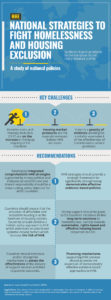A series of country reports and a synthesis report by the European Social Policy Network (ESPN), managed jointly by LISER, Applica and European Social Observatory on national strategies to tackle homelessness and housing exclusion has just been published.
ESPN reports on national strategies to fight homelessness and housing exclusion
Homelessness and housing exclusion are extreme forms of social exclusion that need to be addressed through integrated approaches that successfully deliver on Principle 19 of the European Pillar of Social Rights. While we see the emergence of integrated strategies in some countries, preventing and tackling HHE remains a significant challenge throughout Europe. In the last decade, homelessness is estimated to have increased in 24 out of the 28 EU countries.
Based on in-depth national contributions prepared by the 35 country teams of the ESPN, the synthesis report outlines several key findings. These include the following:
- Currently, it is not possible to provide the total number of homeless people in Europe because data are lacking, or definitions and data are inconsistent.
- However, available data point to an increase of HHE over the last decade in the majority of the 35 countries covered by the ESPN. Finland is the only EU country where homelessness has decreased significantly over the last two decades.
- There are similarities in the profiles of homeless people across Europe (mostly men within working age), as well as emerging profiles within specific national contexts (e.g. young people and an older cohort of homeless people). Women and children remain a more invisible category (often resorting to more informal “hidden” accommodation solutions) due to restricted definitions of HHE.
- In most EU countries, long-standing or more recent negative housing market developments (e.g. steep increases in rental prices, increased insecurity of tenure, rising evictions) are the main determinant behind HHE increases.
- Integrated strategic responses to HHE are on the increase across the EU, although evidence of their effectiveness remains scarce. Very few countries have strong evidence-based mechanisms enabling the assessment of their strategies’ implementation.
- There is evidence of a growing presence of housing-led services (e.g. “Housing First”) across Europe within an overall prevailing “staircase model” of homelessness service provision”, i.e. mostly aimed at making someone “housing ready” by providing support and treatment.
- There is insufficient evidence to assess adequately the effectiveness of existing homelessness services in most of the 35 countries covered. This is particularly striking for services representing the bulk of homelessness service provision across Europe (e.g. emergency and temporary accommodation, day centres).
In the light of the analysis carried out by the 35 ESPN country teams and the ESPN core team, this synthesis report puts forward several recommendations. It calls for more effective policy action at European and national level to prevent and reduce homelessness and housing exclusion.
The synthesis report as well as the country reports on which it is based can be downloaded from the Commission website.

